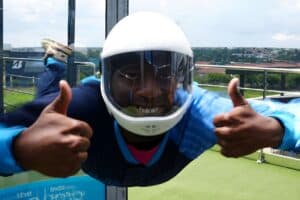Just how impactful is racism in schools on the minds of young South African learners? A psychologist weighs in.

A grade 11 learner from Cornwall Hill College has removed the veil over years of festering racism at the upmarket Pretoria school. The incident she publicly reported happened six years ago when she was in Grade 4.
We are back here again as a nation. Yet another black girl coming to the fore as a sacrificial lamb, crying out a plea the country has heard too many times.
Cornwall Hill College’s Singo Ravele was told by a white teacher as a nine-year-old girl that her hair was not good enough. Singo still recalls the frown on her face that she said, “swallowed me whole”.
“Your hair is unpresentable, it is messy and it not the Cornwall way.”
A black girl was told her natural identity does not have a home in that school.
Since then, Singo has experienced micro-aggressions from her teachers, some black learners being told to “act accordingly”.
ALSO SEE: ‘You’re too smart for a black person’: One of many shocking racism claims at Cornwall Hill
So, how do micro-aggressions and blatant racism affect children’s mental health and sense of self?
According to clinical psychologist Thabang Tlaka: “When your hand breaks at home, you carry that same broken hand everywhere you go.”
This is how trauma works, as Singo recalled the incident six years ago. “It was an emotionally significant moment for her and was lodged in her memory,” Tlaka says.
From that moment, Singo carried that wound with her in all parts of her life, potentially being triggered by similar messaging in other environments.
Children become more conscious of what sets them apart from other people and see those traits as undesirable, instead of something to be embraced.
“Children start seeing the world and navigating it from a different lens, the lens of race,” Tlaka says.
The world becomes black and white. One starts investigating every comment, wondering if what’s been said to them is because of the colour of their skin.
It can even become as extreme as kids wondering if their existence is legitimate.
What exacerbates this trauma is getting the same messaging over and over again.
When schools do not transform and put a stop to discrimination, children keep being triggered by racist comments and micro-aggressions. The continued racism in school plays a big role in hampering the confidence of black children.
What they keep hearing is:
“You are not good enough.”
“You don’t fit in.”
“You don’t deserve to be here.”
“You should change yourself if you want to fit in.”
“You will never make it.”
This has the potential of robbing children of their childhood, who may keep themselves from dreaming because “they are slowly being modulated”, Tlaka says. “Kids no longer function at their best because they are being taught their best is not good enough.”
With older children, particularly teens, racism can derail them from their pursuits. Teenagehood is a critical time for figuring out who you are in the world. “Teens are defining for themselves what their identity is, answering important life questions like the meaning of their lives,” says Tlaka.
When all that work is intercepted by messaging that places their identity in a negative light, they think something is wrong with them and think certain things are not meant for you.
This is where the saying “black child you can do it” comes from. Through racism, children feel some dreams are too big for them.
Talking to your children about race and racism in school
“What parents don’t want to do is give their children information they are not emotionally ready for,” Tlaka says. He also advises parents not to have lessons about race during a crisis.
“Teach them about diversity from a young age,” he advises. Babies as young as six months start being able to recognise differences in skin colour and other features.
Parents need to be proactive about having race conversations with their children. “You’re not telling your kids that they might be hated by others,” Tlaka says. You are simply making them aware of the world around them and that people hold different stances on different features.
Empowering children to deal with racism in schools
Tlaka adds that “parents should equip their children with the right tools and values they need to weather different storms in their lives”. Children will be confronted by different challenges in life and they should be guided how to handle them. Racism is among these things.
History is also important for Tlaka. Telling children about where the country has been will give them a better understanding of its present state. They will learn that not everyone is judgmental of who they are, but the legacy of our history is still felt in other parts of our society, including schools.
This conversation can set up parents and children to a meaningful one, affirming their confidence and strengthening them to not allow themselves to be hurt by racist comments.






